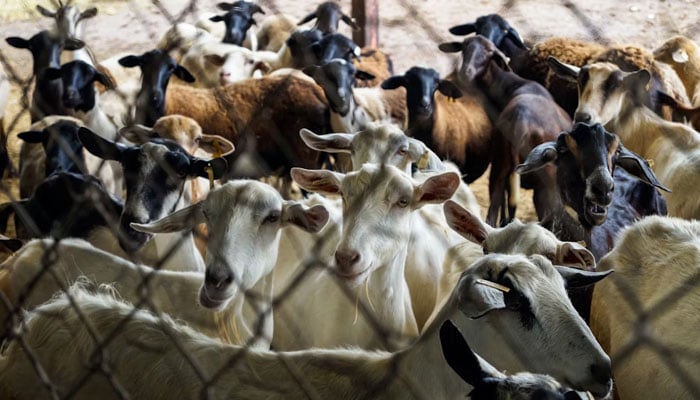Goat farming a speedy way to alleviate poverty in rural South Punjab
MULTAN: The latest goat rearing practices can help enhance income remarkably from 20 to 50 per cent higher than traditional rearing methods and also address the issue of poverty amicably in South Punjab.
South Punjab is a hub of livestock, but most of the cattle-farmers are lacking awareness about modern rearing practices, said Deputy Director Livestock Dr Jamshaid Akhtari while talking to the agency here on Sunday. Makhi Cheeni, Nugri, Nagri, and Faisalabadi beetal goats are very much popular in South Punjab, informed Dr Jamshaid, adding that the cattle farmers should follow modern practices to generate more income from these breeds. Goats can play vital role in addressing issue of poverty in rural areas. Goats are also called as “Cows of the Poor”, because the poor can easily rear it. Even women can rear goats as it is not powerful animal. Its meat has high demand. However, the poor can fulfill milk needs from the goats, he added. As per recommendation of the Pakistan Protein Committee, in our country, everybody should obtain 48 grams of protein from animals, but our per head consumption is only 17 grams, which is very low. Goats give birth twice in a year and it is usually twins or triplets so it can help meet kitchen requirements in poor families.
In Multan division, the farmers possess over 2.5 million goats, which are handsome source to meet daily life expenses in rural areas of South Punjab. When questioned about modern farming techniques, Dr Jamshaid observed that the cattle farmers did not pay focus on record keeping, the expenditures on rearing of animals and earning from the small animals. He observed that the poultry farmers were well aware of record keeping because they knew difference between expenditures and final earning.
The goat farmers lacked sufficient knowledge about the wise use of fodder, nutrition, housing, ventilation, overcrowding at cattle-pens, Dr Jamshaid informed and added that the cattle farmers should have proper awareness about scientific rearing practices because it was very important from earning point of view.
He suggested the farmers to install galvanized wire around cattle-pens instead of bamboos as goats used to eat bamboo which is not good for their health. In covered cattle-pen, every goat should have enough space at least 6 to 10 square feet, however, in the open cattle-pen, it should be double. About feed, he suggested grazing of animals in open field.
Dr Jamshaid proposed that the government should allocate land to the cattle holders for grazing. There is huge space available in the country for this purpose. The investors should also focus on goat rearing because they could export its meat. As its meat has high demand, it can offer handsome return to the investors. Similarly, leaves of “kekar” trees have also good nutritional value. When there is shortage of fodder, the rear should utilise silage, hey and “wanda” as it full of nutritional ingredients, stated Jamshaid. He said that floor of the animal housing should be dry. It should have huge flow of air and light. Shelter should be made in such a way that it should be very suitable for controlling temperature and moisture. Similarly, never let the rain water flow inside the goat housing.
There should be not trash around the animal housing as it would cause spread of diseases. The cattle farmers should contact qualified veterinary doctors instead of quacks. The quacks utterly ignore diagnostic tests and make blunders in treating animals, he concluded.
-
 Brooklyn Beckham Set To Make More Bombshell Claims In Prince Harry Style: Deets
Brooklyn Beckham Set To Make More Bombshell Claims In Prince Harry Style: Deets -
 Prince William Arrives In Bristol To See UK's Most Poweful Supercomputer Isambard-AI
Prince William Arrives In Bristol To See UK's Most Poweful Supercomputer Isambard-AI -
 Dog Dies After Florida Woman Allegedly Sets Neighbour’s House On Fire
Dog Dies After Florida Woman Allegedly Sets Neighbour’s House On Fire -
 AI Will Create Jobs, Not Just Replace Them, Says Nvidia CEO
AI Will Create Jobs, Not Just Replace Them, Says Nvidia CEO -
 Hyundai Labour Rebels Against Robot Deployment, Warns Of Employment Risks
Hyundai Labour Rebels Against Robot Deployment, Warns Of Employment Risks -
 Reviving The ‘Golden Era’: How The New UK-China Partnership Seeks To Strengthen Bilateral Economic Ties
Reviving The ‘Golden Era’: How The New UK-China Partnership Seeks To Strengthen Bilateral Economic Ties -
 Prince Harry Shows Support To Elizabeth Hurley In Court After His Emotional Testimony
Prince Harry Shows Support To Elizabeth Hurley In Court After His Emotional Testimony -
 Amelia Gray Reflects On Her Unconventional Career Journey
Amelia Gray Reflects On Her Unconventional Career Journey -
 Heath Ledger, 'Dark Knight' Star, Remembered On 18th Anniversary
Heath Ledger, 'Dark Knight' Star, Remembered On 18th Anniversary -
 Trump Launches ‘Board Of Peace’ In Davos: Inside Governance, Mandate & Members
Trump Launches ‘Board Of Peace’ In Davos: Inside Governance, Mandate & Members -
 Martin Short Almost Ruined Key Moment Of Selena, Benny's Wedding: Deets
Martin Short Almost Ruined Key Moment Of Selena, Benny's Wedding: Deets -
 This Pixel Phone Feature May Leak Your Calls: Report
This Pixel Phone Feature May Leak Your Calls: Report -
 Ubisoft: Shares Plunge Amid Restructuring Plan And Wave Of Games Cancellations
Ubisoft: Shares Plunge Amid Restructuring Plan And Wave Of Games Cancellations -
 Meghan Markle 'not Anxious' About Prince Harry Moving To UK: Here's Why
Meghan Markle 'not Anxious' About Prince Harry Moving To UK: Here's Why -
 Vaccines May Do Far More Than Prevent Infections
Vaccines May Do Far More Than Prevent Infections -
 Apple Plans To Roll Out Siri AI Chatbot By 2026
Apple Plans To Roll Out Siri AI Chatbot By 2026




